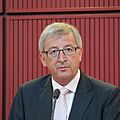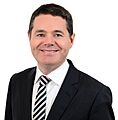Eurogroup facts for kids
The Eurogroup is a special group of people who meet to talk about the euro. The euro is the official money for many countries in the European Union (EU). These countries are called the eurozone.
This group is made up of the finance ministers from each of the 20 eurozone countries. A finance minister is like the chief money manager for their country. They work together to make important decisions about the euro and how the eurozone economy works.
The current leader of the Eurogroup is Paschal Donohoe. He is the Minister for Finance from Ireland. The Eurogroup meetings are usually private. They happen just before a bigger meeting of all EU finance ministers. This group helps make sure the euro stays strong and stable.
Contents
How the Eurogroup Started
The Eurogroup started a long time ago. It was first called "Euro-X" or "Euro-XI." These names changed as more countries started using the euro. France asked for this group to be created. They wanted a place for countries using the euro to talk and work together.
The first meeting was in Luxembourg on June 4, 1998. At first, the leader of the Eurogroup changed often. It was usually the finance minister from the country that was leading the whole European Union at that time.
But in 2004, the ministers decided to choose their own leader. This leader would stay for a longer time. In 2008, something new happened. The leaders of the countries (like presidents or prime ministers) met instead of just the finance ministers. This special meeting was called the Euro summit. It happened more often during the big money problems around 2008.
Over time, the Eurogroup became more important. It helps guide how the euro economy works. Because they meet before other big finance meetings, they can often agree on things first. In 2009, a special agreement called the Treaty of Lisbon officially recognized the Eurogroup and its leader.
How the Eurogroup Works
The President of the Eurogroup
The Eurogroup has a leader called the President. This person helps guide the discussions and represents the group. The current President is Paschal Donohoe from Ireland.
In 2004, the Eurogroup decided to have a President who would serve for two and a half years. The first President was Jean-Claude Juncker from Luxembourg. He started in 2005 and served for many years. Having a President made the Eurogroup stronger. The President now regularly talks to the European Parliament.
After Juncker, Jeroen Dijsselbloem from the Netherlands became President in 2013. He was re-elected in 2015. Then, Mário Centeno from Portugal took over in 2018.
Paschal Donohoe was chosen as the fourth President on July 9, 2020. He started his job on July 13, 2020. He was re-elected on December 5, 2022, for another term that began on January 13, 2023.
-
Jean-Claude Juncker
(2005–2013)
 Luxembourg
Luxembourg -
Jeroen Dijsselbloem
(2013–2018)
 Netherlands
Netherlands -
Mário Centeno
(2018–2020)
 Portugal
Portugal -
Paschal Donohoe
(2020–present)
 Ireland
Ireland
Who Are the Members?
The main members of the Eurogroup are the finance ministers from the 20 countries that use the euro. But other important people also join the meetings. These include the head of the European Central Bank (ECB). The ECB is like the central bank for all euro countries.
Also, the person in charge of economic and money matters for the European Commission attends. The European Commission is like the EU's government. The head of the Eurogroup Working Group also joins. This group helps prepare for the meetings.
Countries in the EU that do not use the euro cannot be observers. Sometimes, people from the International Monetary Fund (IMF) are allowed to be there. It is not always clear if these observers can speak during the meetings.
| Member | Representing | Political party | Member since | ||
|---|---|---|---|---|---|
 |
Paschal Donohoe | European People's Party National: Fine Gael |
14 June 2017 | ||
 |
Markus Marterbauer | Party of European Socialists National: Social Democratic Party |
3 March 2025 | ||
 |
Jan Jambon | European Free Alliance National: New Flemish Alliance |
3 February 2025 | ||
 |
Marko Primorac | Independent | 15 July 2022 | ||
 |
Makis Keravnos | Progressive Alliance of Socialists and Democrats National: Democratic Party |
1 March 2023 | ||
 |
Jürgen Ligi | Alliance of Liberals and Democrats for Europe Party National: Estonian Reform Party |
23 July 2024 | ||
 |
Riikka Purra | European Conservatives and Reformists Party National: Finns Party |
20 June 2023 | ||
 |
Éric Lombard | Independent | 23 December 2024 | ||
 |
Lars Klingbeil | Party of European Socialists National: Social Democratic Party |
6 May 2025 | ||
 |
Kyriakos Pierrakakis | European People's Party National: New Democracy |
15 March 2025 | ||
 |
Giancarlo Giorgetti | Patriots National: League |
22 October 2022 | ||
 |
Arvils Ašeradens | European People's Party National: Unity |
14 December 2022 | ||
 |
Rimantas Šadžius | Party of European Socialists National: Social Democratic Party |
12 December 2024 | ||
 |
Gilles Roth | European People's Party National: Christian Social People's Party |
17 November 2023 | ||
 |
Clyde Caruana | Party of European Socialists National: Labour Party |
22 November 2020 | ||
 |
Eelco Heinen | Alliance of Liberals and Democrats for Europe Party National: People's Party for Freedom and Democracy |
2 July 2024 | ||
 |
Joaquim Miranda Sarmento | European People's Party National: Social Democratic Party |
2 April 2024 | ||
 |
Ladislav Kamenický | Independent (Party of European Socialists suspended) National: Direction – Social Democracy |
25 October 2023 | ||
 |
Klemen Boštjančič | Renew Europe National: Freedom Movement |
1 June 2022 | ||
 |
Carlos Cuerpo | Independent | 29 December 2023 | ||
- Observers
- President of the European Central Bank: Christine Lagarde (since 1 November 2019)
- European Commission: Valdis Dombrovskis (since 1 December 2019)
- Managing Director of the European Stability Mechanism: Pierre Gramegna (since 1 December 2022)
Official Rules for the Eurogroup
For a long time, the Eurogroup did not have official rules written down. But this changed in 2009. A special agreement called the Treaty of Lisbon gave the Eurogroup a legal basis. This means it became an official part of how the EU works.
Protocol 14 of the treaty has two main rules for the Eurogroup:
- Rule 1: The finance ministers from euro countries can meet informally. They meet to talk about their shared duties for the euro. The European Commission and the European Central Bank also join these meetings.
- Rule 2: The ministers choose a President for two and a half years. They vote, and the person with the most votes wins.
The Eurogroup is a special group where the finance ministers from the countries that use the euro currency meet. These countries are all part of the European Union (EU). There are 20 countries in this group. They work together to manage the euro currency and keep the economy of the euro area stable.
The ministers usually meet in private, the day before a bigger meeting of all EU finance ministers called the Economic and Financial Affairs Council (ECOFIN). They share their decisions through press releases. The Eurogroup is connected to the Council of the European Union and became an official group under the Treaty of Lisbon.
What is the Eurogroup?
The Eurogroup helps countries using the euro work together on important money matters. It's like a team meeting for the finance leaders of the euro countries.
How the Eurogroup Started
The Eurogroup began because France wanted a place for countries using the euro to talk and plan together. It was first called "Euro-X" or "Euro-XI" depending on how many countries were using the euro at the time. The idea was approved in December 1997, and the first meeting happened on 4 June 1998 in Luxembourg.
At first, the leader of the Eurogroup changed often, following the main EU presidency. But in 2004, the ministers decided to elect their own president for a longer time. In 2008, the leaders of the euro countries (like prime ministers or presidents) met for the first time. This special meeting is called the Euro summit. It happened more often during the 2008 financial crisis to help solve big money problems.
Over time, the Eurogroup's role in managing the euro's economy grew. Because they meet before the ECOFIN council, they can often agree on decisions about the euro area first. In 2009, the Treaty of Lisbon made the Eurogroup and its president officially recognized.
How the Eurogroup Works
The Eurogroup has a president and includes finance ministers from all euro countries. Other important people also join their meetings.
The President's Role
The current President of the Eurogroup is Kyriakos Pierrakakis, who is the Minister for the National Economy and Finance of Greece. He was elected on 11 December 2025.
The Eurogroup decided in 2004 to have a president who serves for two and a half years. Jean-Claude Juncker from Luxembourg was the first president, starting in 2005. He helped make the Eurogroup stronger and more visible. For example, the president now attends meetings with the European Parliament Committee on Economic and Monetary Affairs every six months.
After Juncker, Jeroen Dijsselbloem from the Netherlands became president in 2013. He was reelected in 2015. Then, Paschal Donohoe from Ireland was elected in 2020 and re-elected in 2022. He was elected for a third term in July 2025 but later resigned. Makis Keravnos from Cyprus was acting President until Kyriakos Pierrakakis was elected.
-
Jean-Claude Juncker
(2005–2013)
 Luxembourg
Luxembourg -
Jeroen Dijsselbloem
(2013–2018)
 Netherlands
Netherlands -
Mário Centeno
(2018–2020)
 Portugal
Portugal -
Paschal Donohoe
(2020–2025)
 Ireland
Ireland -
Kyriakos Pierrakakis
(2025–present)
 Greece
Greece
Who Attends the Meetings?
Besides the finance ministers from the euro countries, other important people attend the meetings. These include the President of the European Central Bank (currently Christine Lagarde), the European Commissioner for Economic and Financial Affairs (currently Valdis Dombrovskis), and the head of the Eurogroup Working Group. The Managing Director of the European Stability Mechanism, Pierre Gramegna, also attends.
The Rules of the Eurogroup
For a long time, the Eurogroup didn't have official rules written in a treaty. This changed with the Treaty of Lisbon in 2009. This treaty added a special section, Protocol 14, which sets out two main rules for the group.
The first rule says that the finance ministers of the euro countries will meet informally. They discuss things related to their shared responsibility for the euro. The European Commission and the European Central Bank are also invited to these meetings.
The second rule states that these ministers will elect a president for two and a half years. This president is chosen by a majority vote of the euro countries.
The treaty also changed how voting works in the main EU Council. When the full ECOFIN council votes on issues that only affect the euro area, only the countries that use the euro are allowed to vote. These changes helped make the Eurogroup's work more official.
Ideas for the Future
People often discuss how the Eurogroup could work even better. Some ideas include having a single "economic government" for the euro area or a dedicated "Eurozone finance minister." These ideas aim to make decisions faster and stronger for the euro countries. There are also discussions about how the Eurogroup can work together more effectively on the world stage, for example, in groups like the International Monetary Fund (IMF) and the G20.
See also
 In Spanish: Eurogrupo para niños
In Spanish: Eurogrupo para niños
 | John T. Biggers |
 | Thomas Blackshear |
 | Mark Bradford |
 | Beverly Buchanan |





